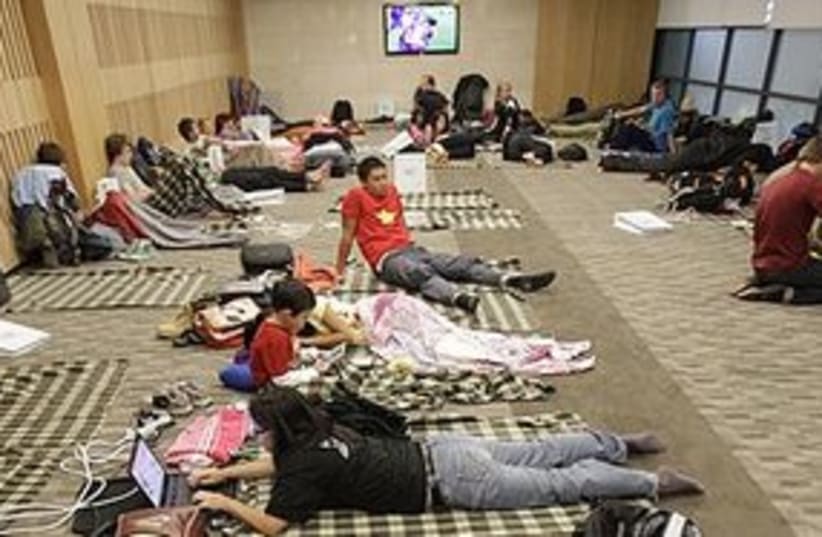RELATED ARTICLES:Israeli planes resume some EU routesEU agrees to resume air trafficBut with more than 95,000 flights canceled in the last week alone, airlines faced the enormous task of working through the backlog to get passengers where they want to go — a challenge that could take days or even weeks.Passengers with current tickets were being given priority; those who had been stranded for days were told to either buy a new ticket or take their chances using the old one — a wait that could be days or weeks for the next available seat."Once your flight's canceled, you go to the back of the queue," said Laurie Price, director of aviation strategy at consultant Mott Macdonald, who was stranded in Halifax, Canada. "It seems intrinsically unfair."Scientists were worried that the eruption could trigger an even larger eruption at the nearby Katla volcano, which sits on the massive Myrdalsjokull icecap. Its last major eruption was in 1918.Volcano experts say that should such an eruption occur, air travelers might expect more disruptions, depending on prevailing winds. Of Iceland's eight volcanic eruptions in the last 40 years, only the recent one at Eyjafjallajokull was followed by winds blowing southeast toward northern Europe.Early on Tuesday, a Eurocontrol volcanic ash map listed the airspace between Iceland and Britain and Ireland as a no-fly zone, along with much of the Baltic Sea and surrounding area."Flying was canceled because it's difficult to predict exactly where the cloud is going to be or the effect it will have on aircraft engines," she said.The aviation industry — facing losses of more than $1 billion — hassharply criticized European governments' handling of the disruptionthat grounded thousands of flights on the continent."I don't believe it was necessary to impose a blanket ban on all U.K.airspace last Thursday," said Willie Walsh, chief executive of BritishAirways, which has canceled about 500 flights a day in the past fivedays. "My personal belief is that we could have safely continuedoperating for a period of time."The U.N.'s International Civil Aviation Organization said Tuesday itwill start work on setting global standards for the concentration ofashes that could affect airplane engines.Raymond Benjamin, secretary-general of the U.N. agency responsible foraviation safety, said ICAO convened a special meeting of its governingcouncil on Monday on ash standards following the global disruption toair travel caused by the volcanic eruption.
EU flights resume but chaos not over
British Airways and El Al renew flights to London as Heathrow reopens.

RELATED ARTICLES:Israeli planes resume some EU routesEU agrees to resume air trafficBut with more than 95,000 flights canceled in the last week alone, airlines faced the enormous task of working through the backlog to get passengers where they want to go — a challenge that could take days or even weeks.Passengers with current tickets were being given priority; those who had been stranded for days were told to either buy a new ticket or take their chances using the old one — a wait that could be days or weeks for the next available seat."Once your flight's canceled, you go to the back of the queue," said Laurie Price, director of aviation strategy at consultant Mott Macdonald, who was stranded in Halifax, Canada. "It seems intrinsically unfair."Scientists were worried that the eruption could trigger an even larger eruption at the nearby Katla volcano, which sits on the massive Myrdalsjokull icecap. Its last major eruption was in 1918.Volcano experts say that should such an eruption occur, air travelers might expect more disruptions, depending on prevailing winds. Of Iceland's eight volcanic eruptions in the last 40 years, only the recent one at Eyjafjallajokull was followed by winds blowing southeast toward northern Europe.Early on Tuesday, a Eurocontrol volcanic ash map listed the airspace between Iceland and Britain and Ireland as a no-fly zone, along with much of the Baltic Sea and surrounding area."Flying was canceled because it's difficult to predict exactly where the cloud is going to be or the effect it will have on aircraft engines," she said.The aviation industry — facing losses of more than $1 billion — hassharply criticized European governments' handling of the disruptionthat grounded thousands of flights on the continent."I don't believe it was necessary to impose a blanket ban on all U.K.airspace last Thursday," said Willie Walsh, chief executive of BritishAirways, which has canceled about 500 flights a day in the past fivedays. "My personal belief is that we could have safely continuedoperating for a period of time."The U.N.'s International Civil Aviation Organization said Tuesday itwill start work on setting global standards for the concentration ofashes that could affect airplane engines.Raymond Benjamin, secretary-general of the U.N. agency responsible foraviation safety, said ICAO convened a special meeting of its governingcouncil on Monday on ash standards following the global disruption toair travel caused by the volcanic eruption.